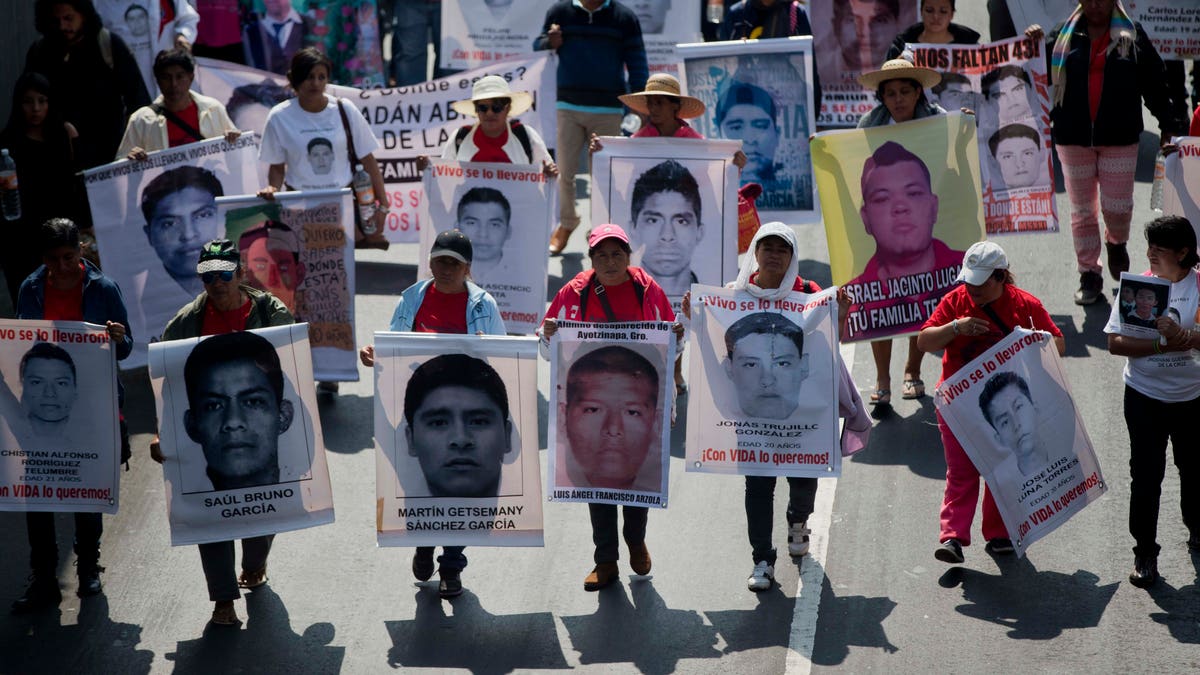
FILE - In this Jan. 26, 2015 file photo, relatives and protestors carry pictures of some of the 43 students who went missing in Sept. 26, 2014 from a rural teachers college in Guerrero state, during a march in Mexico City. Mexico has a serious problem with disappearances and lacks a comprehensive national list of the missing to effectively deal with the problem, according to a report the countrys National Human Rights Commission will present Monday, Feb. 2, 2015 to the U.N. (AP Photo/Eduardo Verdugo, File)
MEXICO CITY (AP) – Mexico has a "serious problem" with disappearances and lacks a comprehensive national list of the missing to effectively deal with the problem, according to a report by the country's National Human Rights Commission will present Monday to the United Nations.
Commission chairman Luis Raúl González Pérez will ask the United Nations Committee on Enforced Disappearances in Geneva, Switzerland, to make several recommendations to Mexico's government on the issue, said the document, which the Associated Press was allowed to see.
According to the latest official figures, there are 23,271 people missing or not located in Mexico, of which 621 actively being sought by the federal Attorney General's Office's Search Unit. The numbers were provided by the office's general prosecutor for human rights, Eliana García, on Jan. 19 to a forum in the Chamber of Deputies.
But in its report, the human rights commission says there is no clear criteria for establishing how many people are missing and stresses that the "impunity" surrounding forced disappearances in the 1970s and 1980s created the conditions for the crime to continue being committed today, as can be seen with the 43 students who disappeared in September in Mexico's southern Guerrero state.
González Pérez said officials needs to systemize and debug various existing databases because there is no "effective, comprehensive and transparent national" registry that would allow officials to know the real number of people who have disappeared in Mexico.
The commission will ask that authorities in Mexico continue the search for clandestine graves, identify the bodies found in them and create a unified system for building a reliable national list of the disappeared that includes a genetic registry. It will also call on lawmakers to complete pending legislation related to the National Registry of the Disappeared or Missing Persons and the law on forced disappearances.
The government of President Enrique Peña Nieto promised on taking office that it would release verifiable figures on the number of the disappeared in Mexico. In August 2014, it published a list of 22,322 persons who have gone missing since 2006. A total of 9,790 of them disappeared since the beginning of his presidency on Dec. 1, 2012.
Eliana García, speaking to lawmakers in January, gave the new official figure which has roughly 1,000 more missing, without explanation. But a legislative press release that day said the new registry of the missing dates back to 2003.
The attorney general and six of Mexico's 32 regions have begun working on a unified database, but the process is slow. As of last September, Mexico City's Federal District, one of the most capable regional governments in this regard, had only entered data for 20 of the 13,000 unidentified bodies it has in its files.
Relatives of the missing, including families of the 43 students from the Ayotzinapa rural teachers college in Guerrero, have traveled to Geneva to share their experiences with the U.N. committee.
The relatives have questioned the government's conclusion that the students were killed and incinerated by a drug cartel after being seized by police.
